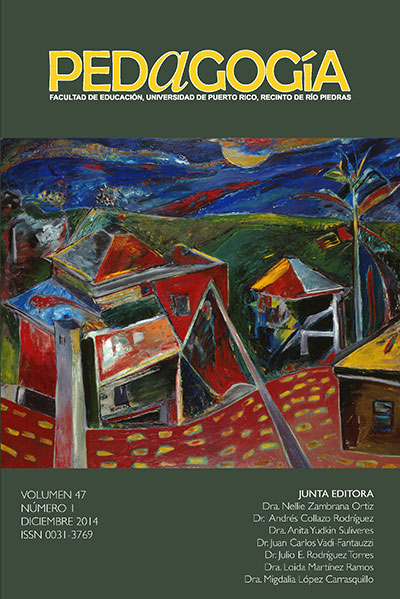Resumen
This article analyzes the work of the English Institute (1943-1949) of the University of Puerto Rico, Rio Piedras, under the leadership of Lewis C. Richardson. After discussing the history of English teaching in Puerto Rico from 1898 to 1949, it describes the inception of the English Institute, its key leaders and agents, as well as its objectives. It scrutinizes the structure of the pilot project for teaching English in grades 1-4, the materials produced, and the progress made by the students. Finally, it clarifies why the program was abandoned by the Department of Education and considers the implications of this decision.
How to cite:
Pousada, A. (2014). English Institute of 1943-1949 under the Leadership of Lewis C. Richardson. Pedagogía, 47(1), 51-75. Retrieved from https://revistas.upr.edu/index.php/educacion/article/view/16357
Citas
Ayala, C. J. & Bernabe, R. (2007). Puerto Rico in the American century: A history since 1898. Chapel Hill, NC: University of North Carolina Press.
Cebollero, P. (1945). A school policy for Puerto Rico. San Juan, Puerto Rico: Imprenta Baldrich.
Chardón, C. E. (1998). Education. In L. D. Bender. (Ed.), The American presence in Puerto Rico (pp. 206-225). Hato Rey, PR: Publicaciones Puertorriqueñas.
English Institute. (circa 1945). Factors associated with English illiteracy among the Puerto Rican draft. Unpublished mimeographed study. San Juan, PR: Author.
English Institute. (1946). Guide for the teaching of oral English in the first grade [Mimeo]. San Juan, PR: Author.
English Institute. (1947). Guide for the teaching of oral English in the second grade [Mimeo]. San Juan, PR: Author.
English Institute. (1947). Guide for the teaching of English reading in the third grade [Mimeo]. San Juan, PR: Author.
Fife, H. & Manuel, H. T. (1951). The teaching of English in Puerto Rico. San Juan, PR: Department of Education Press.
Fries, C. C. (1945). Teaching and learning English as a Foreign Language. Ann Arbor, MI: University of Michigan Press.
Giró sobre el inglés vista del Comité Chávez (1943, February 20). El Mundo, p. 2.
International Institute of Teachers College. (1926). A survey of the public educational system of Porto Rico. New York, NY: Teachers College, Columbia University.
Mackey, W. (1953). English teaching in Puerto Rico. English Language Teaching Journal, 8 (1), 12-15.
Mohr, E. V. (1988). Lewis C. Richardson: A man of principle. Rio Piedras, PR: University of Puerto Rico Press.
Muñiz Souffront, L. (1950). El problema del idioma en Puerto Rico. San Juan: Biblioteca de Autores Puertorriqueños.
Negrón de Montilla, M. (1970). Americanization in Puerto Rico and the public school system, 19001930. Río Piedras: Editorial Edil.
Osuna, J. J. (1949). A history of education in Puerto Rico. Rio Piedras: University of Puerto Rico Press.
Padín, J. (1916). The problem of teaching English to the people of Puerto Rico. San Juan: Bureau of Supplies, Printing and Transportation.
Padín, J. (1935). English in Puerto Rico. Reprinted from the Puerto Rico School Review.
Protesta por el veto de Truman fue ordenada (1946, November 9). El Mundo.
Richardson, L. C. (1945). The English verb. Unpublished manuscript.
Rojas, P. M., Fries, C. C., & Hull, A. L. (1952). Fries American English series for the study of English as a Second Language, book one. Boston: D. C. Heath & Co.
Roosevelt, F. D. (1937). Letter on teaching English in Puerto Rico. April 7, 1937. Retrieved from: http:/www.presidency.ucsb.edu/ws?pid=15386
Torres González, R. (2002). Idioma, bilingüismo y nacionalidad: La presencia del inglés en Puerto Rico. San Juan, PR: Editorial de la Universidad de
Puerto Rico.
University of Michigan, English Language Institute (ELI). (2006). History: On the occasion of its 65th birthday, June 21, 2006. Retrieved from: http://www.lsa.umich.edu/eli/aboutus/history
Van Deusen, E. K. (1926). Stories of Porto Rico. New York: Silver, Burdett & Company.
El contenido que aparece en la Revista de Educación de Puerto Rico se distribuye gratuitamente y está disponible bajo las prácticas de acceso abierto, de acuerdo con la licencia de Creative Commons, Atribución-NoComercial 4.0 Internacional (CC BY-NC 4.0). Mediante estos principios, la revista y sus autores permiten a los lectores acceder, reproducir y compartir los textos completos de los artículos. Los usuarios deben dar crédito a los autores de forma razonable sin sugerir que tienen el apoyo de ellos. Bajo ninguna circunstancia, los lectores pueden hacer uso de los contenidos con propósitos comerciales. Los autores conservan los derechos de autor sobre sus trabajos.

